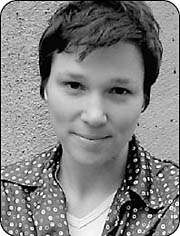IT’S OVER, but what did SIFF mean? After 25 days and 210 features and docs, the 26th Seattle International Film Festival concluded on Sunday with an awards brunch at the Space Needle. There, the Golden Space Needle Awards were ironically announced on the lowest level of said edifice (the upper deck being reserved for more valuable tourists). Whatever the elevation, the pinnacle of film achievement was recognized in two main areas: jury awards (bestowed by a few insiders) and the popular vote, cast by devoted SIFF-goers who dutifully tore and returned some 60,000 ballots.
Surely the results must yield a secret pattern, a hidden significance, just as the Oscar or recent Cannes honors are studied and scrutinized for the snubbed, the excluded, the overlooked, and the overpraised. Let’s go to work:
On the popular side, Chinese mainland director Zhang Yang got top nod for Shower and his direction thereof. Among the runners-up were Sundance fave Girlfight and Canadian entry The Five Senses, while Japan’s When the Rain Lifts finished second in overall balloting. It’s significant that two non-English language films from Asia should trump a bunch of American indie flicks, proving again that subtitles are no obstacle for Seattle audiences. Shower is tentatively slated to open here in mid-July; it’s one of many recent films to address the widening gulf between Old and New China (Zhang Yimou’s Not One Less being another example), couching its conflict in richly humanistic terms with a bit of comedy and sentimentalism thrown in.
French actress Nathalie Baye earned her Needle with both An Affair of Love and Venus Beauty Institute, where she plays characters obsessed with—you guessed it—sex, which always translates well into English. Both films are infused with a certain overserious, overdramatized Gallic intensity about doomed romance that often draws snickers between the naughty bits. (Look for Affair this summer.) Meanwhile, Dan Futterman was voted best actor for Urbania, which currently lacks distribution. Among documentaries, it’s no surprise that ex-Seattleite Shaya Mercer’s WTO-themed Trade Off—opening soon—topped the local populist/radical vote.
TIRED, PLEASED SIFF director Darryl Macdonald had this to say: “It’s certainly the best festival we’ve ever done, and by all accounts the audience feels exactly the same way.” Was he surprised by the votes for so many international titles? “No, not really. The safe bets—the ones that people might’ve heard about from other festivals that were American indie films or films that they knew were going to come back for a theatrical release—didn’t do as well . . . as films where people took a gamble.”
Macdonald added, “I’d like to just slightly shrink the festival, keep it in the area of 175-180 films.” Moreover, the work of finding the 2001 crop of SIFF entries starts “tomorrow,” looking overseas to the just-completed Cannes fest and ahead to Toronto in the fall. “It never stops,” he concluded.
What else? Some 100,000-plus attended the fest (up 20 percent from last year), and the quality of films was generally strong—particularly in docs and world cinema. Although Love’s Labour’s Lost didn’t prove to be such a brilliant US premiere, and while there was no first-rate mainstream Hollywood feature to debut, SIFF can still call itself the preeminent audience-oriented fest in the US. That there was no breakout commercial title isn’t surprising after the largely hit-free Cannes and Sundance festivals.
We can all agree that SIFF’s poster and slogan (“Life is looking up”) were both disasters, along with those cloying SIFF promos shown before each feature. Audiences hissed their eternal recurrence throughout the festival, uniting disparate tastes in the abhorrence of cheese—which proves how SIFF bonds its cinema-savvy viewers through both a love for the good and a hatred of the bad.








